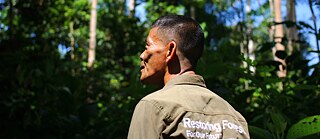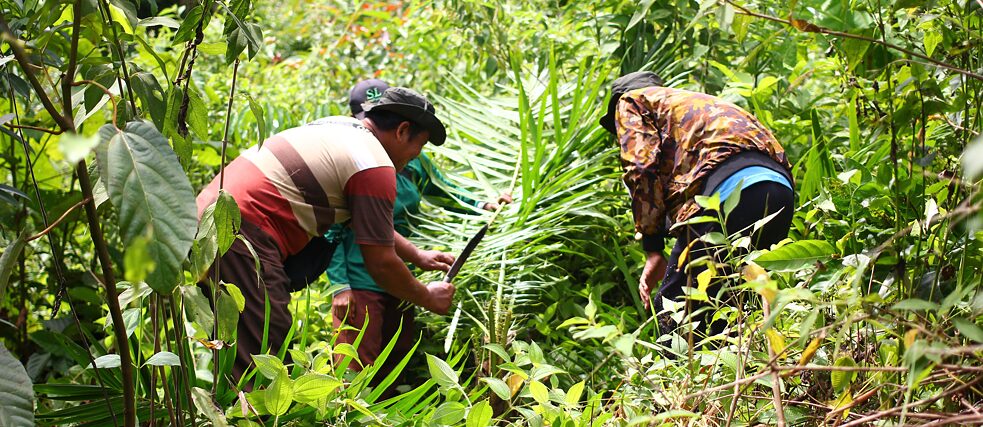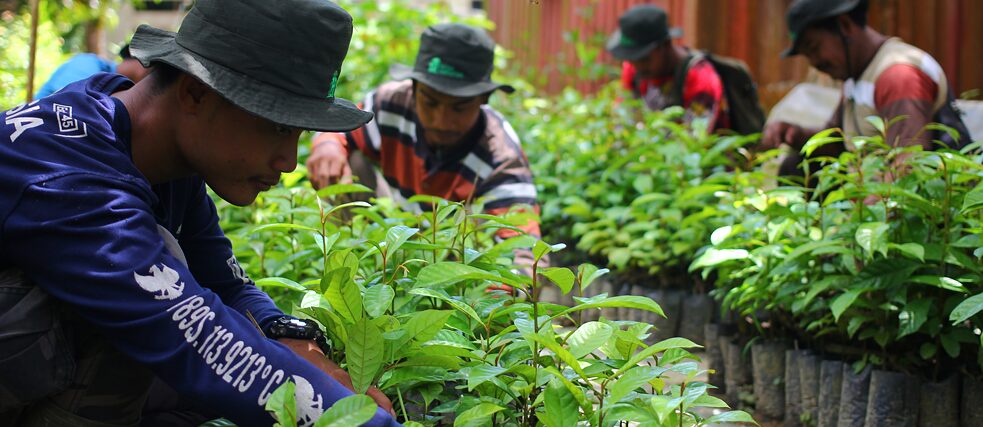Community Warden Guardians of the Sumatran Rainforest

Samsu, leader of the community warden team of the Kelompang group.
| © Elviza Diana
Eight members of the Batin Sembilan community traverse through an area with medang (Lauraceae family) and kempas (Koompassia Malaccensis Maing) trees, where otherwise only tall ilalang grass and daun babi plants grow under the sun – thorny shrubs tearing open the sleeves of their shirts. Formed into a community warden (community-based patrol), the Batin Sembilan act as guardians of biodiversity in the Hutan Harapan area. The designated area for rainforest restoration stretches along the border between the Jambi and South Sumatra provinces in Indonesia.
Three years ago the story began, when the initiative was taken up to found a so-called community warden programme for the Hutan Harapan in an effort to protect the area’s biodiversity. Realizing the significance of involving the local communities the Batin Sembilan, in form the the Kelompang community and the Simpang Macan Luar community, decided to get involved. The Batin Sembilan say that they have inhabited the lowland forests of Sumatra since the seventh century AD, and therefore have an extensive knowledge and in-depth understanding of this ecosystem. Based on their local knowledge, they have been acting as guardians of nature since the time of the Sriwijaya Kingdom (7th century AD). There are currently 252 Batin Sembilan families living within the Hutan Harapan area.“The Indigenous group of the Batin Sembilan is a valuable partner to us. They serve as a crucial pillar in our efforts to preserve Hutan Harapan,” emphasised TP Damanik, head of the forest protection management at PT REKI, which is an administration consisting of international NGOs and Indonesian institutions and in charge of the reforestation of Hutan Harapan. “They are the custodians of local wisdom and hold the knowledge about all life within this forest passed down from generation to generation.”
Defending their Homeland with Machetes and Saws
The community warden programme is a tangible initiative aimed at preserving Hutan Harapan. A patrol team consists of thirty individuals, who conduct patrols twice a week inevery corner of the 98,555 hectare forest. “We want to shield our forest from illegal logging,” says Teguh Sartika, member of the patrol team. “We have encountered many loggers invading our community to illegally fell tress. That being said,” she adds, “a road leading to a mine cuts right through the forest, which is our home.”Patrol expedition in May 2023: About five kilometers from the starting point, the gaze of the team members meets a harrowing scene. Cleared land stretches out before their eyes, overgrown with young oil palms that were apparently only recently planted. “Witnessing this sight, our hearts stop. It feels as if our lives were abruptly jolted by an undeniable reality. These oil palm trees are a sign of the destruction, an irresponsible action that threaten the sustainability of our environment,” Samsu explain in a hoarse but determined voice.
 Removal of illegally planted oil palm trees in the Hutan Harapan area. | © Elviza Diana
Removal of illegally planted oil palm trees in the Hutan Harapan area. | © Elviza Diana
Economic Independence
In addition to participating in the forest protection teams, 13 Batin Sembilan groups have already signed a memorandum of understanding (MoU) with the Hutan Harapan administration. This MoU establishes a partnership with the forestry sector, granting the Batin Sembilan groups the freedom to sustainably protect the forest while generating economic returns from non-timber products. This gives the Batin Sembilan group an official mandate to participate in measures preserving Hutan Harapan.This partnership allows the Batin Sembilan communities to engage in their traditional sustainable practices in the forest, as long as they do not endanger the protection of nature. People can hunt traditionally, cultivate agricultural products and collect non-timber products of the forest. In addition, they are entitled to economic returns from the forest products, which they process sustainably. Within this partnership, the Hutan Harapan administration provides technical support, advice, and market access for the non-timber forest products manufactured by the Batin Sembilan communities, aiming to improve their standard of living and establish forest-based activities as a sustainable source of livelihood.
In addition to the patrols, the PT REKI team and the community wardens actively conduct environmental education and awareness programmes in the Hutan Harapan area. They organise meetings with local communities, including Batin Sembilan groups, to foster understanding of the importance of preserving biodiversity and natural resources, and the negative impact of environmentally destructive practices. “Education and environmental awareness are pivotal for sustainable change,” says Hospita, Communications Manager of PT REKI. “Through these programmes, we aim to raise community awareness regarding the forest's protection and the life it sustains. We all share a responsibility for preserving this natural heritage.”
 The nursery area where the Batin Sembilan contribute to reforestation efforts in Hutan Harapan. | © Elviza Diana
The nursery area where the Batin Sembilan contribute to reforestation efforts in Hutan Harapan. | © Elviza Diana
However, this journey is far from over. Many challenges remain in protecting tropical forests and the struggle of these people must continue.